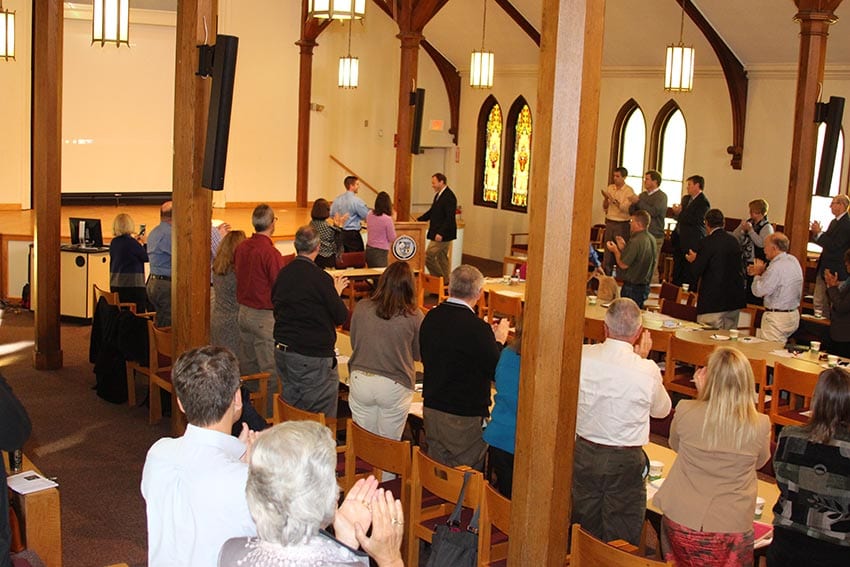March 3, 2016
Portland Press Herald
By Eric Russell
AUGUSTA — A legislative committee gave preliminary approval Thursday to a measure that would create a single statewide waiting list and online application to obtain federal housing assistance through the program known as Section 8.
Kelly Martineau of Durham tells the Legislature’s Labor, Commerce, Research and Economic Development Committee about her problems finding housing. Martineau, who has been waiting for housing for 2½ years, said, “What’s really needed is more help to pay for housing, or just more housing, especially affordable housing.”
Many who testified at a public hearing before the committee’s vote said approving the bill should be just the first step in addressing the broader problems of homelessness and affordable housing throughout the state.
“This will greatly simplify things for those that have to put themselves on multiple wait lists,” said Kelly Martineau of Durham, who has been waiting for housing for 2½ years and is now staying with a friend. “But what’s really needed is more help to pay for housing, or just more housing, especially affordable housing.”
As drafted, the measure would implement the recommendations of a recent report by the Maine Affordable Housing Working Group, including one to create a single, statewide application and waiting list for Section 8 housing that can be filled out online. Applicants now must put themselves on multiple waiting lists for communities that handle their own Section 8 vouchers.
Members of the Labor, Commerce, Research and Economic Development Committee unanimously endorsed the bill, L.D. 1607. It now goes to the House and Senate for consideration.
LONG WAIT, THEN SCARCE HOUSING
Section 8 is offered to low-income households and administered through MaineHousing, the state’s housing authority, or through local housing agencies. Maine has been funded for about 12,000 vouchers, 3,800 of which are handled through MaineHousing, but there is a disconnect between receiving vouchers and finding housing. Landlords are not obligated to take in Section 8 clients and there is often a shortage of available housing. In other cases, housing is so expensive that the voucher doesn’t cover the rental amount.
Although it’s not clear exactly how many people remain on waiting lists for Section 8 housing statewide because some of those vouchers are handled by individual cities and towns, MaineHousing spokeswoman Deborah Turcotte said the number is as high as 11,000. In some cases, she said, people on the list can wait three years, but it varies depending on the applicant’s location.
A single application and waiting list will improve coordination among the state and local housing authorities and, hopefully, get people into housing sooner. Turcotte said the bill also would allow the application to be considered for two lesser-know
Mary Beth Paquette, right, executive director of Rural Community Action Ministry, told legislators that the problem of finding housing looks different away from cities like Portland and Lewiston. “The rural homeless live in cars, in campers, in tents … anywhere,” she said. Joe Phelan/Kennebec Journal
n assistance programs – the federal Shelter Plus Care program and the state’s Bridging Rental Assistance Program.
Finally, the bill would direct MaineHousing to examine options to increase access to affordable housing for families with incomes at least 30 percent below their area’s median income and to establish a rental assistance pilot program.
Many people spoke in favor of the bill, including people representing agencies that serve low-income Mainers. No one spoke in opposition.
Peter Merrill of MaineHousing said a streamlined and simpler application for Section 8 would improve the process greatly. He said the authority is prepared to begin the rental assistance pilot program as an alternative to Section 8. Funding will dictate how well that program goes, he said.
WIDESPREAD LACK OF AFFORDABILITY
Even with a streamlined application process, advocates said, the overall lack of affordable housing is an overriding issue. James Gagne, who works at Portland’s Preble Street, said 87 percent of the households that his social services agency assisted last year could not find housing.
Joby Thoyalil, a policy analyst with Maine Equal Justice Partners, which assists low-income Mainers, said affordability of housing is a major problem, not just in Portland. According to a study of fair-market rents for two-bedroom apartments by county, as well as the extremely low-income population in each county, the percentage of monthly income dedicated to housing ranged from 53 percent to 66 percent.
Mary Beth Paquette, representing the Rural Community Action Ministry, said the problem looks different farther from social services centers such as Portland and Lewiston.
“You won’t find people on the street or hanging out at the soup kitchen,” she said. “The rural homeless live in cars, in campers, in tents, on couches, in the woods and just about anywhere they can find shelter from the elements.”
Martineau, who is still waiting for housing assistance for herself and her two children after being kicked out of the house she was living in when it was sold, said she is fortunate to be able to stay with a friend.
She knows others don’t have that option.
“Sometimes, even when people have resources, they can’t find an empty apartment,” she said.




